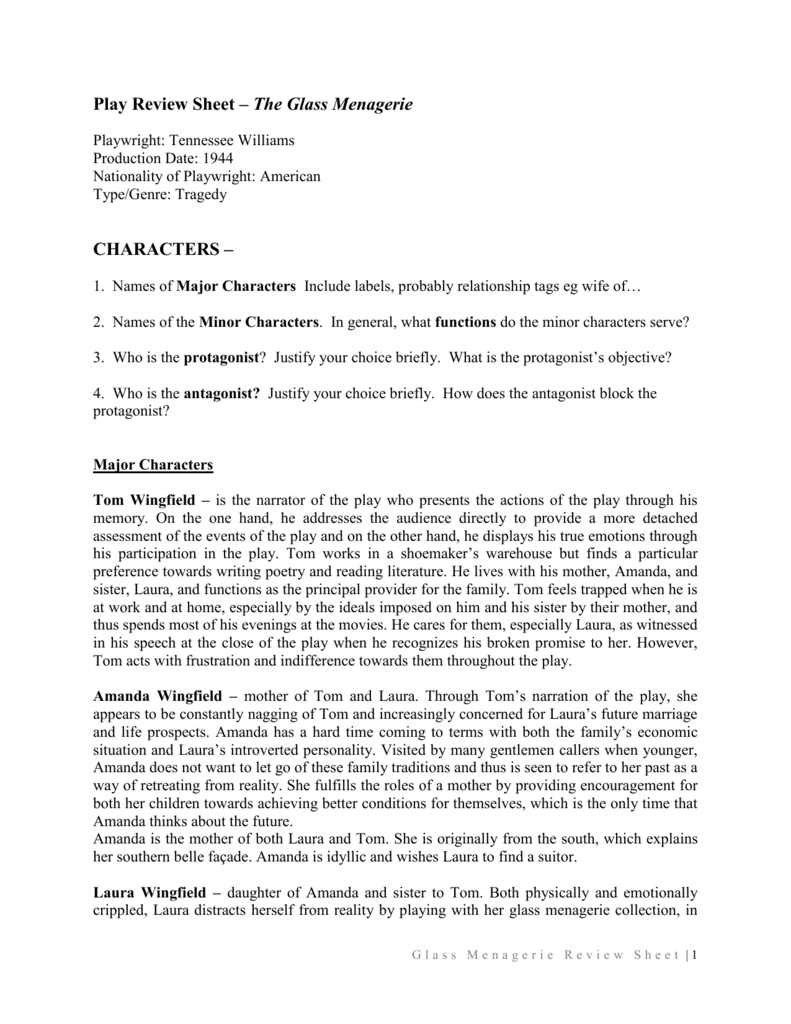

He is an outgoing and enthusiastic man on whom Laura had a terrible crush in high school. Tom brings home Jim O'Connor, a fellow employee at the warehouse. Amanda asks Tom to bring home gentlemen callers to meet Laura.
#THE GLASS MENAGERIE MONOLOGUE FREE#
If Tom and Amanda can find a husband for Laura, a man who can take care of her, then Tom will be free of his responsibility to them.

He fights with Amanda all the time, and the situation at home grows more unbearable.Īmanda, sensing that Tom wants to leave, tries to make a deal with him. His only escape comes from his frequent visits to the movies, but his nightly disappearances anger and baffle Amanda. He has stayed because of his responsibility for them, but his mother's nagging and his frail sister's idiosyncrasies make the apartment a depressing and oppressive place.

Tom longs to be free - like his father - to abandon Amanda and Laura and set off into the world. After the fiasco at Rubicam's Amanda gives up on a business career for Laura and puts all her hopes into finding a husband for her.Īmanda's relationship with Tom is difficult. She discovers that Laura stopped attending class a long time ago, because the speed tests on the typewriter terrified her. She enrolled Laura in classes at Rubicam's Business College, hoping that a career in business would make Laura self-sufficient. She busies herself caring for her "glass menagerie," a collection of delicate little glass animals.Īmanda dreams constantly of the long-ago days when she was a young Southern belle and the darling of her small town's social scene. She is also slightly lame in one leg, and she seldom leaves the apartment of her own volition. Laura is a frightened and terribly shy girl, with unbelievably weak nerves. He works at the Continental Shoemakers warehouse during the day, but he disappears nightly "to the movies." Amanda is a loving mother, but her meddling and nagging are hard to live with for Tom, who is a grown man and who earns the wages that support the entire family. Their father abandoned them years earlier, and Tom is now the family's breadwinner. In 1937 they live together in a small apartment in St. The action of the play centers on Tom, his mother Amanda, and his sister Laura. The narrator addresses us from the undated and eternal present, although at the play's first production (1944-5), Tom's constant indirect references to the violence of the Second World War would have been powerfully current. The events of the play are framed by memory - Tom Wingfield is the play's narrator, and usually smokes and stands on the fire escape as he delivers his monologues. My enemies plan to dynamite this place.The action of The Glass Menagerie takes place in the Wingfield family's apartment in St. On those occasions they call me– El Diablo! Oh I could tell you many things to make you sleepless.
#THE GLASS MENAGERIE MONOLOGUE PATCH#
I wear a patch over one eye and a false mustache, sometimes I put on green whiskers. I go to gambling casinos, I spin away fortunes on the roulette table. Mother, I’ve joined the Hogan gang, I’m a hired assassin, I carry a Tommy gun in a violin case! I run a string of cat houses in the Valley! They call me Killer, Killer Wingfield, I’m leading a double life, a simple, honest warehouse worker by day, by night a dynamic czar of the underworld, Mother. Why, listen, if self is what I thought of Mother, I’d be where he is-GONE! As far as the system of transportation reaches! Don’t grab at me, Mother! I’m going to the movies!…No, no I’m going to opium dens! Yes, opium dens, dens of vice and criminals’ hangouts. I go! For sixty five dollars a month I give up all that I dream of doing and being ever! And you say self-self’s all I ever think of. TOM: Listen! You think I’m crazy about the warehouse? You think I’m in love with Continental Shoemakers? You think I want to spend fifty five years down there in that celotex interior? with– florescent tubes! Look! I’d rather somebody picked up a crowbar and battered out my brains–than go back mornings! I go! Every time you come in yelling that Goddamn “Rise and Shine!” “Rise and Shine!” I say to myself, “How lucky dead people are!” But I get up. By Tennessee Williams (Signet: pp.52-53)


 0 kommentar(er)
0 kommentar(er)
